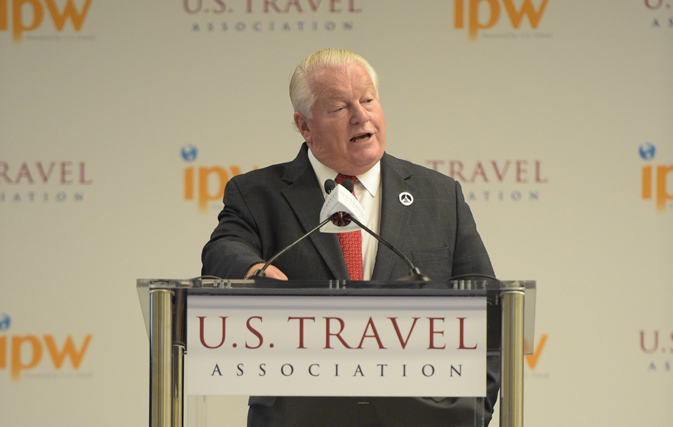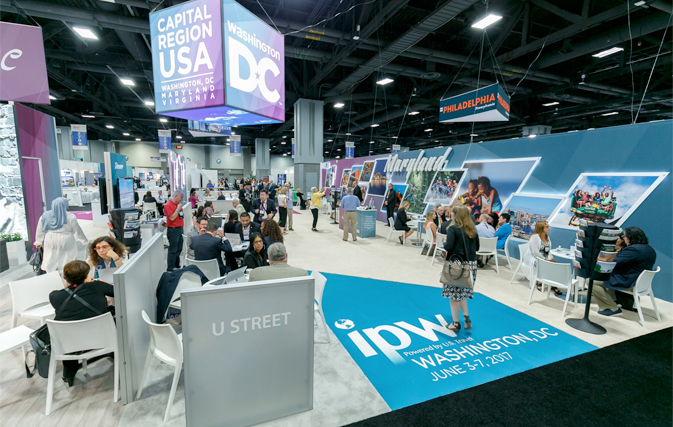WASHINGTON D.C. — There was an added sense of urgency and national pride at this year’s IPW Conference, where talk of U.S. President Trump’s proposed budget cuts to tourism ran rampant throughout the four-day event.
Taking place in Washington D.C. for the first time from June 3-7, the U.S. Travel Association’s 49th annual IPW – known as the single largest generator of international travel to the U.S. – welcomed over 6,400 attendees from 70 countries, all of whom were still reeling from the recent news that Brand USA (the federally funded organization that promotes the U.S. as a tourist destination) may be eliminated as a result of President Trump’s controversial budget proposal.
With this in mind, the unofficial theme of this year’s conference was one of unity and hospitality, with IPW sending a ‘Welcome’ message to all international buyers, media and potential visitors in attendance. Building on ‘welcome’ campaigns staged by dozens of U.S. destinations and travel businesses in recent weeks, attendees were greeted with ‘One Big Welcome’ imagery around the show floor. That message was reiterated by U.S. Commerce Secretary Wilbur Ross, who said: “If there is one message for you to take away today, it is this: We are taking every measure to ensure that the U.S. remains competitive for providing a quality visitor experience, while also ensuring the safety of both our citizens and our guests.”
Over the course of five days, a record of more than 112,000 pre-scheduled meetings were conducted between travel buyers and U.S. travel suppliers (including destinations, hotels and attractions), who purchased nearly 1,300 booths. Media attendance this year also broke IPW records, with 530 domestic and international journalists on site.
But the real winner of the conference was the country itself. According to the independent research firm Rockport Analytics, travel initiated by IPW is expected to bring over US$4.7 billion in direct bookings to U.S. destinations from abroad over the next three years. Plus, IPW is expected to generate $1.7 billion in economic impact to the District, and attract more than one million additional visitors to the region for an estimated three years following this year’s event.

U.S. Travel Association President and CEO Roger Dow. Credit: Aaron Clamage.
“IPW is a unique event that brings the world to the U.S. while showcasing the benefits of its host city to thousands of travel buyers and media at once,” said U.S. Travel Association President and CEO Roger Dow. “Not only is this year’s gathering an excellent opportunity to drive home our message of welcome, but it’s also a great way to showcase U.S. Travel’s home city of Washington, D.C. as more than just what you see on the news.”
The U.S. Travel Association shared several key trends at the conference, all of which highlighted the importance of tourism for the country. More international visitors came to the U.S. than expected in April 2017, defying expectations of outright decline in reaction to President Trump’s executive orders on travel and immigration, first issued on Jan. 27.
In fact, international travel grew by about 4% year-over-year in April. Because the average international visitor embarks on a trip to the U.S. 56.9 days after their initial travel search, any fallout from President Trump’s controversial orders in January and February 2017 would only begin to register in April travel data.
“Are we surprised by this data? The honest answer is yes,” added Dow. “There have been many claims that the administration’s actions on travel have tarnished America’s brand abroad, but we’re seeing hard economic evidence of the U.S. travel sector’s remarkable resilience. Even though we’re encouraged by these strong figures, we’ll continue to urge the administration to more publicly send the message that while the U.S. is closed to terror, it remains open for business.”
Despite strong international travel growth in April, travel overall grew at a slower year-over-year rate in April 2017 than in March 2017. Domestic leisure travel growth remained strong, while domestic business travel growth tapered, due in part to the timing of holidays like Easter and Passover this year.

